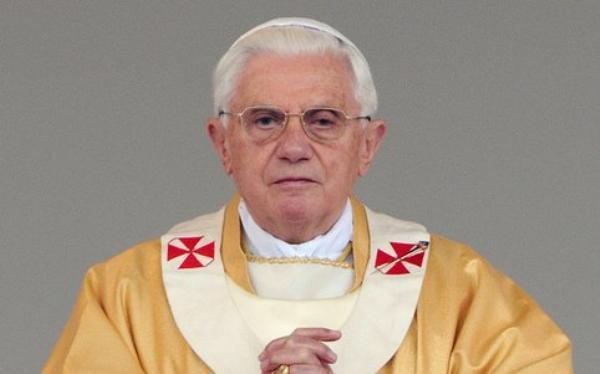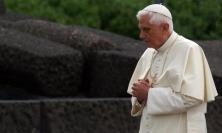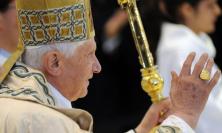As Pope Benedict XVI’s historic resignation takes effect this evening, Thinking Faith asks four authors to tell us why they are thankful for his ministry during his eight-year papacy. Niall Keenan, Angela Kitching, John Moffatt SJ and Anouska Robinson-Biggin fcJ take this opportunity to express their gratitude for Pope Benedict.
Niall Keenan
I remember being overcome with emotion when Cardinal Ratzinger was elected Pope. I suppose I had taken Pope John Paul II for granted – in my living memory he had always been pope. But now here was something new. The humility of Pope Benedict XVI’s opening words struck me: ‘a poor labourer in the Lord’s vineyard.’ I was gripped; I wanted to know him better.
I set out to read his writings. What I realised was that there was a radical disconnect between the writer of the books and the perceived persona of Cardinal Ratzinger. His prose style was gentle; a piercing intelligence shone through, and beyond that a sense of immense kindness, compassion and the closeness of God.
I went to hear him speak. I experienced an unforgettable few days at the World Youth Day in Cologne. I watched his speeches online. And I was left with a sense of profound gratitude, gratitude to God that the Church had such a wonderful man as its leader. Pope Benedict has been so often misrepresented that I can do no better than to quote here some of his most moving words, and I urge others to read his writings. The style is distinctive and the message always clear, with striking imagery and beautiful simplicity.
So, at Cologne on the subject of the Magi (in honour of whose relics Cologne cathedral was built): ‘Dear friends, this is not a distant story that took place long ago. It is with us now. Here in the Sacred Host he is present before us and in our midst. As at that time, so now he is mysteriously veiled in a sacred silence; as at that time, it is here that the true face of God is revealed.’[1]
On the power of the Crucifixion: ‘this is like inducing nuclear fission in the very heart of being – the victory of love over hatred, the victory of love over death. Only this intimate explosion of good conquering evil can then trigger off the series of transformations that little by little will change the world.’[2]
To young people in America: ‘Dear friends, truth is not an imposition. Nor is it simply a set of rules. It is a discovery of the One who never fails us; the One whom we can always trust... ultimately truth is a person: Jesus Christ... authentic freedom is not an opting out, it is an opting in; nothing less than letting go of self and allowing oneself to be drawn into Christ’s very being for others.’
Again: ‘Let your imaginations soar freely along the limitless expanse of the horizons of Christian discipleship. Sometimes we are looked upon as people who speak only of prohibitions. Nothing could be further from the truth! Authentic Christian discipleship is marked by a sense of wonder. We stand before the God we know and love as a friend.’
Again: ‘Contemplating Jesus on the Cross we see love in its most radical form. We can begin to imagine the path of love along which we must move.’[3]
And finally, from a question and answer session with children, to Adriano who had asked what Eucharistic Adoration is, he replied: ‘... Adoration means saying: “Jesus, I am yours. I will follow you in my life, I never want to lose this friendship, this communion with you”... adoration is essentially an embrace with Jesus in which I say to him: “I am yours, and I ask you, please stay with me always”.’[4]
Niall Keenan is a member of the Thinking Faith editorial board.
Angela Kitching
Retirement is usually defined as the time when someone stops working completely because they are eligible to claim a pension, have failing health, or because regulations require them to stop working. In his statement to announce his resignation, Pope Benedict acknowledged that age and illness had led to his decision: he said, ‘I have come to the certainty that my strengths, due to an advanced age, are no longer suited to an adequate exercise of the Petrine ministry.’ It would be reasonable to assume from these words that the Pope’s age was a burden to him; but the reason I am grateful to Benedict XVI is for being a positive witness to the strengths and values of old age.
At the start of his pontificate, Benedict XVI said, ‘Each of us is willed, each of us is loved, each of us is necessary’.[5] He chose to repeat this phrase on his visit to London during an address to older people living at St Peter’s Residence. This was typical of Benedict’s determination to draw attention to the value and beauty of advanced age. During the same address, he said the growing numbers of people living longer were a ‘blessing for society’.[6] He referred to the kinship with his congregation that his own age afforded him, saying, ‘I come among you not only as a father, but also as a brother who knows well the joys and the struggles that come with age.’
Some of the speculation about the new pope has focused on how different candidates are good with young people. Ministering to the young is an important role which is vital to the Church’s future. But we must avoid building a Church for the future at the expense of failing to minister to the people in the pews alongside us now, who in Britain are very often older people.
In one of his final public visits, Benedict XVI went to a residential care home in Rome and said that civilisation should be judged on the way it cares for its elderly. Building appropriate ministry and pastoral support for an ageing society is a challenge the Church must also face. I am grateful that amongst Benedict XVI’s last public words as pope, as an evidently frail man, he chose to remind us of the positive things old age can bring: he said, ‘I want to say to you with profound conviction – it is beautiful to be old!’[7]
Angela Kitching works for Age UK but is writing in a personal capacity.
John Moffatt SJ
After being elected 8 years ago, Pope Benedict had a tough act to follow. John Paul II had won people over by his charisma and integrity. Joseph Ratzinger was a quiet man, an academic theologian. His job in Rome had been to call other theologians to account for potential deviation from official Catholic teaching – hence his nick-name, ‘God’s Rottweiler’. There was an expectation that he would lead an effort to make Catholicism more ‘like it used to be’ – at least in the minds of some.
Pope Benedict, the ‘German Shepherd’, has indeed led, or at least supported, a movement towards more old-fashioned styles of liturgy – the new translation is a product of that movement. However, precisely because he had the reputation of a conservative intellectual, committed to defending the integrity of the Catholic tradition, he has also been able to do or say surprising things as pope that are liberating for the Church.
His resignation is an example. If a ‘liberal’ Pope had resigned, conservatives could treat this as an accident, never to be repeated. But when someone who has such a deep knowledge and love of the tradition does so for the sake of the good government of the modern Church, it is much easier to see this as a proper part of the Church’s history and a natural development of the tradition.
When John Paul II talked about love, you could generally guess where it was going. The still new Pope Benedict produced his first encyclical on ‘God is love’. The world’s media was waiting to criticise yet another text about Catholic teaching on artificial contraception. There was a sense of shock and awe as commentators realised that they were reading a profound meditation on the nature of love, human and divine, which condemned no-one but invited all to a dialogue of shared experience. And this dialogue was reinforced by his decision to quote not just from Scripture and the Saints, but also from Marx and Descartes. In this and later writings, he ‘officially’ took seriously thinkers considered hostile to religion and endorsed the methods of modern Biblical criticism. In so doing, he ‘officially’ shows how the Church can learn new things from people outside the Church.
Before he visited the UK the media portrayed him as a highly controversial figure, an enemy of the modern state who would be widely rejected by his own flock. When he arrived, we saw a mild-mannered, sensitive pastor, gladly welcomed by thousands of people. His finely judged, thoughtful speech to the two houses of parliament recognised and appreciated the values of his hosts’ democratic institutions. We saw a man of personal prayer and conviction who genuinely wanted to meet the rest of the world in dialogue, rather than lay down the law.
People anxious about tradition often get very worried about ‘modern thought’ or the ‘modern state’. Such fear can have a devastating effect on the intellectual and political life of the Church. But Benedict, as pope, has taught that it is not just allowed, but vital for the Church to develop its tradition through a respectful dialogue with the people of our times. This is an important legacy for the coming decades.
John Moffatt SJ teaches scripture at the Jesuit Institute South Africa.
Anouska Robinson-Biggin fcJ
My gratitude for Benedict XVI is not so much for what he has written, though his encyclicals, particularly Caritas in Veritate, were a pleasure to study when I was living in Canada for a year. I have been more touched by his personal witness of being a man of God, at the service of the Church.
When he was elected, I was a Teacher of Religious Education and was faced with a barrage of questions from the students –‘Why have they given us another old man?’ I didn't have an answer, but over the past eight years I have come to understand the gift he has been for me.
Even though I was born before the beginning of his pontificate, John Paul II was the pope I had grown up with. I had got so much from the World Youth Day gatherings and was worried that, when Benedict XVI came into office, he would cancel them. However, I remember the pride I felt as I saw him (on the television) sailing down the river in Cologne in 2005, greeting the youth of the world, and remember thinking that, even if this was not his style, he had gone beyond his comfort zone to reach out to others. This spoke deeply to me and for the witness he gave, I give thanks.
As part of the gathering of religious in the chapel at St. Mary's, Twickenham during his visit to the UK, I had the chance to see him close-up, and to encounter, visually, the human being. I was touched. He was much shorter than I had thought and his hair was so white. He reminded me of a grandfather. I was grateful for his words, his sharing about the importance of the education he had received from the ‘English Ladies’; and later at The Big Assembly, for the human touch he showed in shaking the hands of the pianist who accompanied our gospel choir. This was not part of the show, but his love of music rewrote the script, causing anxiety to those responsible for security but giving a wonderful witness that people are more important than procedure. I know that made a big impact not just on me as an observer, but on the whole choir.
My third reason to be grateful is a memory from the vigil at World Youth Day 2011 in Madrid. I was grateful that in spite of the extremes of weather and the loss of his hat, he stayed to pray with us! It would have been so much easier to walk away, but there was something very powerful in his staying, his faithfulness to the young even when not so young himself. I was again left humbled by his witness. My gratitude therefore is rooted in his humanity, and I am deeply grateful for his bravery in stepping down. What a wonderful witness this is. He has rewritten the course of history and made a powerful statement: he is saying, ‘God may be invincible but I am not; I am human, and that means I experience human frailty and human weakness, like everyone else.’ It shows that even though he was expected to continue until death, he chose to listen to that ‘still, small voice of calm’ within and to follow its promptings, and that took courage. I think this final act will stay with me for many years to come.
Sister Anouska Robinson-Biggin fCJ is Director of Young Adult Ministries at the Mount Street Jesuit Centre in central London.
[1] http://www.vatican.va/holy_father/benedict_xvi/speeches/2005/august/documents/hf_ben-xvi_spe_20050820_vigil-wyd_en.html
[2] http://www.vatican.va/holy_father/benedict_xvi/homilies/2005/documents/hf_ben-xvi_hom_20050821_20th-world-youth-day_en.html
[3] http://www.vatican.va/holy_father/benedict_xvi/speeches/2008/april/documents/hf_ben-xvi_spe_20080419_st-joseph-seminary_en.html or on video at http://www.uspapalvisit.org/video_audio.htm
[4] http://www.vatican.va/holy_father/benedict_xvi/speeches/2005/october/documents/hf_ben_xvi_spe_20051015_meeting-children_en.html
[5] http://www.vatican.va/holy_father/benedict_xvi/homilies/2005/documents/hf_ben-xvi_hom_20050424_inizio-pontificato_en.html
[6] http://www.vatican.va/holy_father/benedict_xvi/speeches/2010/september/documents/hf_ben-xvi_spe_20100918_st-peter-residence_en.html
[7] http://www.telegraph.co.uk/news/worldnews/europe/vaticancityandholysee/9672517/Pope-Benedict-XVI-declares-it-is-beautiful-to-be-old.html





![Photo by Sergey Gabdurakhmanov [gabdurakhmanov] on flickr.com](https://www.thinkingfaith.org/sites/default/files/styles/article_bottom_block_222x133/public/field/image/benedictrip_site.jpg)
